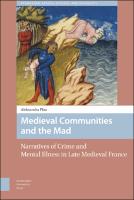Medieval Communities and the Mad
Narratives of Crime and Mental Illness in Late Medieval France
Abstract
The concept of madness as a challenge to communities lies at the core of legal sources. This book considers how communal networks, ranging from the locale to the realm, responded to people who were considered mad. The madness of individuals played a role in engaging communities with legal mechanisms and proto-national identity constructs, as petitioners sought the king's mercy as an alternative to local justice. The resulting narratives about the mentally ill in late medieval France constructed madness as an inability to live according to communal rules. Although such texts defined madness through acts that threatened social bonds, those ties were reaffirmed through the medium of the remission letter. The composers of the letters presented madness as a communal concern, situating the mad within the household, where care could be provided. These mad were usually not expelled but integrated, often through pilgrimage, surveillance, or chains, into their kin and communal relationships.
Keywords
Madness; Insanity Defense; Pardon; CommunityDOI
10.5117/9789462983359ISBN
9789462983359Publisher
Amsterdam University PressPublisher website
https://www.aup.nl/Publication date and place
Amsterdam, 2020Series
Premodern Health, Disease, and Disability,Classification
History and Archaeology
CE period up to c 1500
Literary studies: ancient, classical and medieval


 Download
Download